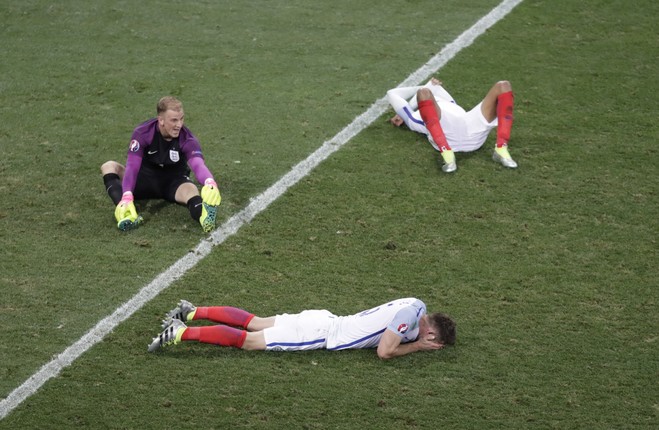SCROLLING THROUGH SOCIAL media on Monday night, the general reaction among Irish people to England’s deflating defeat to Iceland was mainly a mixture of shock, delight and amusement.
Few people had expected Iceland — a country with a population of roughly 334,000, approximately 10% of whom were reported to have traveled to France – to beat England, the inventors of the game, one of the pre-tournament favourites to win Euro 2016 outright in the eyes of the bookmakers and with a squad more expensive than any other team in the competition according to one in-depth study.
Despite the vast majority being avid followers of English club teams, Irish fans, and presumably other non-English viewers to an extent, reveled in Roy Hodgson’s side’s embarrassment. Why?
On the one hand, it’s natural for fans with no vested interest in either team of a particular football match to root for the underdog. Everyone loves a sensational story — and Iceland’s heroes trumping Roy’s flops most certainly fit the bill.
So on the one hand, it was irrelevant who Iceland beat in the round of 16 — given their incredibly limited resources, there would surely have been a similar reaction if they had defeated Germany, Italy, Spain or one of the other so-called ‘big’ footballing nations.
Yet at the same time, the fact that the opponents were Iceland the other night was irrelevant to a degree — cheering against England appears to be a habit that the majority of Irish fans have acquired early in their football-viewing lives. The fact that the defeat was registered by a team who have long been considered minnows of European football only sweetened the sense of schadenfreude.
To cite one example, a few years ago, 15 to be exact, a friend was watching a World Cup qualifier between England and Germany in an Irish bar. When Germany took the lead, virtually the entire pub erupted with joy.
Shortly thereafter, England equalised. The whole establishment was silent save for two English fans at the back that no one had noticed up until that point, as the outnumbered pair proceeded to celebrate the goal unashamedly. The rest of the pub, meanwhile, sat silent and slightly mortified at the fact that they had cheered so vigorously against our neighbours, while two Englishmen had sat inconspicuously in close attendance.
Yet that moment sums up the conflicted feelings about being ABEs (Any But England). Ask the average Irish supporter why they explicitly cheer against England and assuming they aren’t die-hard Republicans, they will insist they have ‘nothing against the English’.
Instead, they will most likely point to the hype around the team largely constructed by the English media and the ‘overrated’ Premier League as pet peeves.
Yet is it not the case that every country’s media and people in general tend to get a little over excited by the prospect of competing at major tournaments? What would English people have made of Irish TV media coverage of the Euro 2016 defeat of Italy and the euphoria that ensued, the constant focus on the Irish fans and interviews with family members of the team? Surely that too was verging on the type of Sky Sports-esque hyperbole that most Irish football fans love to mock.
Sure, many England football fans and media still habitually reminisce about ’66, but Irish people need little excuse to reflect nostalgically on Ray Houghton’s goal against Italy in ’94. We laugh their outrage over Diego Maradona’s infamous ‘Hand of God,’ but then grow indignant when Thierry Henry does more or less the same thing at the Boys in Green’s expense.
Similarly, the Premier League may indeed be overrated and few would argue against the notion that the vast sums being spent on its players are ludicrous, but the English top flight is still indisputably one of the best competitions in Europe by any measure and as last year’s title race showed, it has the capacity for drama, unpredictability and relative competitiveness that few others tend to match.
In contrast with Leicester’s heroics, look at Serie A, which Juventus have won the past five seasons on the bounce, or Ligue 1, which PSG won by 31 points this season. Bayern are generally dominant in the Bundesliga, as are Real Madrid and Barcelona in La Liga — in these leagues, the champions collapsing (as Chelsea did last year) is almost unthinkable.
And besides, is the Premier League’s crazy money really that valid a reason for consistently rooting against the English national side?
Perhaps, there’s a more simple reason for this ill feeling against the Three Lions. Since 1966, England have won just six knockout matches at major tournaments — Ecuador in 2006, Denmark in 2002, Spain in 1996, Belgium and Cameroon in 1990, and Paraguay in 1986.
Nearly every tournament, England are talked of as being among the favourites, but by this stage, inglorious failure has become a safe bet.
So, just as many Irish football fans grew up supporting Man United ostensibly because, until recently, they were the closest thing to guaranteed success, the alternative to rooting against England is almost inevitable disappointment. Why choose to back a group of perpetually overpaid underperformers when the other option is bound to be so much more gratifying?
The42 is on Snapchat! Tap the button below on your phone to add!


